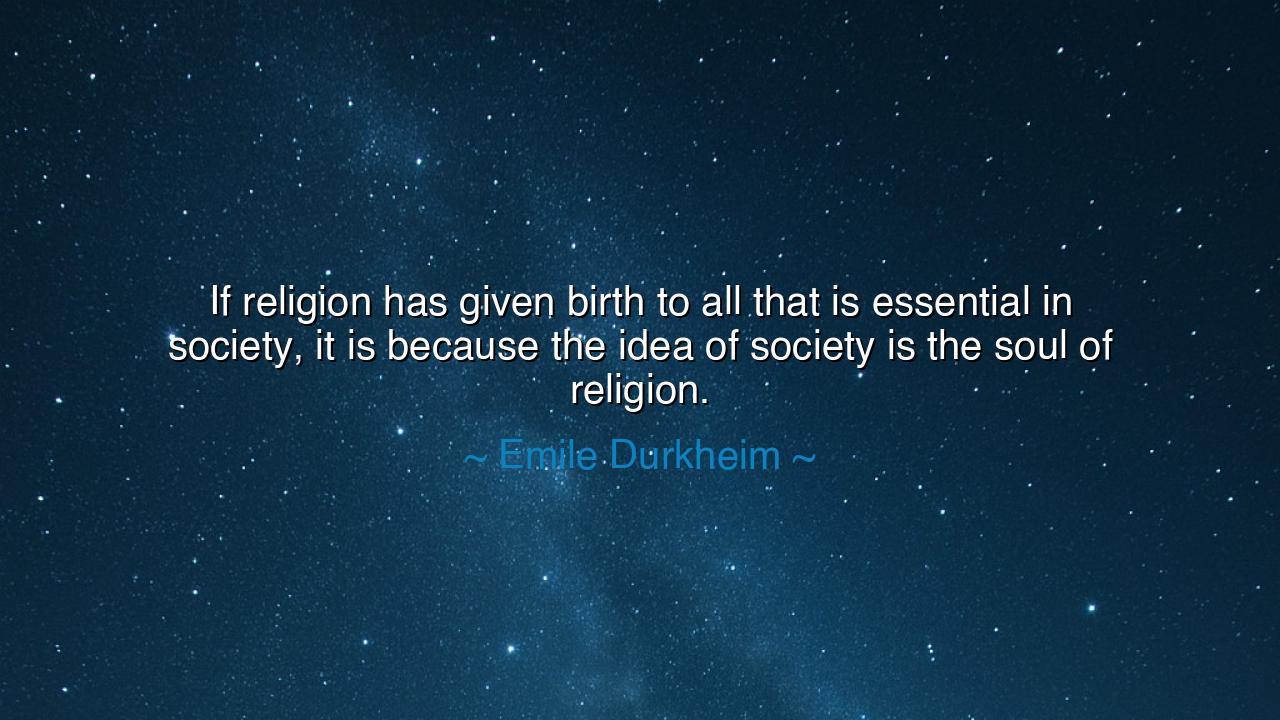
If religion has given birth to all that is essential in society
If religion has given birth to all that is essential in society, it is because the idea of society is the soul of religion.






"If religion has given birth to all that is essential in society, it is because the idea of society is the soul of religion." These profound words from Émile Durkheim encapsulate a central truth about the intricate relationship between religion and society. Durkheim, one of the foundational figures of sociology, posits that religion is not merely a system of beliefs or practices centered around the divine, but that it is deeply intertwined with the very fabric of social life. At its core, religion serves as the spiritual foundation of society, and the idea of society itself—the bond between individuals, the sense of community, the moral compass guiding collective behavior—is what animates religion, giving it its power and purpose.
From the ancient times, the sacred and the societal were always closely connected. Religions across the world have consistently provided the moral framework for people to live together in harmony, to uphold shared values, and to form social bonds that transcend the individual. The ancient Egyptians, for instance, saw their pharaoh not just as a ruler but as a divine representative, a figure who embodied the moral and spiritual order of society. This idea is echoed in many cultures, where the gods were thought to have created and governed the social order, ensuring that the fabric of life held together in balance.
In his writings, Durkheim argues that society itself is not just an aggregate of individuals, but an entity with its own soul, much like a living organism. He suggests that religion is the sacred expression of that collective consciousness, which binds people together in a unified moral system. In the Christian tradition, for example, the church has long been seen as a place where individuals come together not only to worship but to find community, to receive moral guidance, and to serve a higher purpose. Here, society is not merely a collection of individuals, but a living organism, nourished and guided by the shared spiritual practices and the moral code that religion provides.
Consider the example of the Hindu caste system, which was not merely a social hierarchy, but one grounded in religious doctrine. In this case, religion served as the very structure upon which the social order rested. The dharma, or moral code, given by religious teachings, dictated the roles and responsibilities of each individual within the society. This system, deeply rooted in religion, provided the moral and spiritual justification for the societal organization, thus showing how religion can shape and give meaning to the very structure of society. In this way, society is not only shaped by religion, but religion itself is shaped by the needs and morality of society, thus intertwining them in a mutual dance of influence.
Similarly, consider the Islamic Ummah, or community, which is bound together not only by shared religious beliefs but by a profound sense of collective responsibility. In Islam, the faith does not exist in isolation; it is inherently communal. The Five Pillars of Islam, including prayer, fasting, and almsgiving, are as much about individual spiritual growth as they are about building a cohesive, responsible community. The idea of society, according to Durkheim, is what gives religion its soul, for it is through the communal practices and shared rituals that individuals experience a sense of belonging to something greater than themselves.
But Durkheim’s insight is not only about how religion shapes society, but also about how society shapes religion. As societies evolve, so too do the religions that arise from them. In the Modern Age, many religions have adapted to the changing needs of society, reflecting new moral and social values. For example, the rise of secularism in many parts of the world has prompted some religious groups to adapt their teachings to be more inclusive, or to address modern issues such as human rights, gender equality, and environmentalism. Religion, in this sense, is not a stagnant force, but a living expression of the social consciousness of its time.
The lesson that Durkheim imparts to us is clear: religion is not something outside of society, but something that shapes and reflects the deepest values of society itself. It is the soul of society, the moral framework that guides us, and the force that binds us together. To understand religion is to understand society—for one cannot exist without the other. In our own lives, we must recognize the power of shared beliefs and practices, and how they shape not only our personal lives but the communities in which we live.
Thus, let us reflect on the interconnection between our beliefs and the societies we build. Just as religion is deeply rooted in the values of the community, so too must we work to ensure that the societies we build are grounded in moral principles that uplift and strengthen us all. Let us cultivate communities that reflect the shared humanity we all share, and let our religions, in whatever form they may take, continue to guide us toward a future where justice, compassion, and unity flourish.






AAdministratorAdministrator
Welcome, honored guests. Please leave a comment, we will respond soon